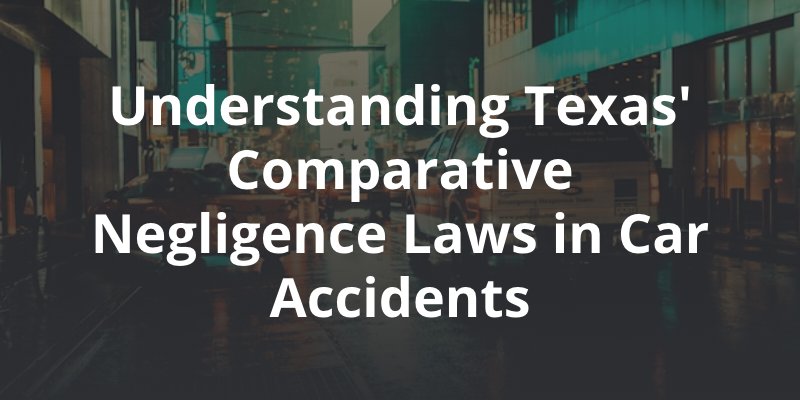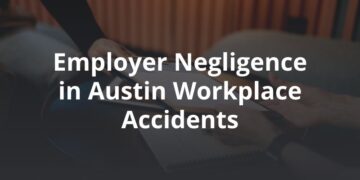
If you get injured or suffer property damage in a car accident in Texas, a legal doctrine known as comparative negligence may affect your claim. In Texas, this law could diminish your financial recovery if you are found to have contributed to the car accident. An experienced Austin car accident lawyer can help if your case involves this defense.
What Is Comparative Negligence?
The concept of comparative negligence allocates fault for an accident or injury to more than one party during a personal injury claim. It allows for a proportional distribution of liability (legal and financial responsibility) based on each party’s degree of fault for an accident.
Ordinary negligence refers to a party’s failure to use proper care, or a level of care that is reasonable and appropriate based on the circumstances. Comparative negligence describes more than one party that was negligent or otherwise at fault for an accident or injury.
If the comparative negligence doctrine applies to a car accident case, an insurance company or the courts will assign a percentage of fault to each party based on their contributions to the crash. This could affect the financial compensation or damages awarded, depending on the circumstances.
What Is Texas’s Modified Comparative Negligence Law?
There are pure and modified comparative negligence laws. Texas follows a modified comparative negligence rule with a 51 percent liability bar. This means the claimant (known as the plaintiff) must be less than 51 percent at fault for an automobile accident to qualify for financial damages.
If this cap is exceeded, meaning the plaintiff is allocated the majority share of fault, he or she cannot recover damages from the other parties involved. Texas’s modified comparative negligence law is found in Tex. Civ. Prac. & Rem. Code § 33:
Sec. 33.001. PROPORTIONATE RESPONSIBILITY. In an action to which this chapter applies, a claimant may not recover damages if his percentage of responsibility is greater than 50 percent.
This law applies to any personal injury cause of action based on a tort, or wrongdoing, for which a defendant is found responsible for a percentage of the harm suffered. As long as the party is found to be 50 percent or less at fault for the car accident, he or she can still recover financial compensation. However, the damages awarded will be reduced or diminished by an amount equivalent to the degree of fault.
How Might the Comparative Negligence Defense Affect Your Car Accident Case?
In some car accident cases, fault is clear and only allocated to one party. In others, however, fault may not be as obvious or two or more parties may share fault. Under the modified comparative negligence law, victims can recover partial compensation even if they are partly at fault for a motor vehicle accident.
Texas law states: Sec. 33.012. AMOUNT OF RECOVERY. (a) If the claimant is not barred from recovery under Section 33.001, the court shall reduce the amount of damages to be recovered by the claimant with respect to a cause of action by a percentage equal to the claimant’s percentage of responsibility.
Under this rule, if a car accident case goes to trial, a judge will assign the plaintiff a percentage of responsibility based on the facts involved. Then, the financial award granted to the plaintiff will be reduced based on that percentage.
For example, if one driver is 80 percent at fault for running a red light but another driver is 20 percent at fault for speeding, the injured driver’s damages would be reduced by 20 percent. In this example, a total award of $200,000 would be reduced by 20 percent ($40,000) to $160,000.
The Importance of Minimizing Your Degree of Fault
In states that abide by pure comparative negligence rules, such as California and Florida, an injured accident victim could still receive financial compensation regardless of his or her degree of fault (short of 100 percent). Texas, however, has modified this rule to bar recovery for anyone found to be more than half responsible.
Texas’s comparative negligence law makes it important to minimize your degree of fault as much as possible during a car accident claim. Otherwise, you could be at risk of losing the ability to obtain financial compensation from another driver’s car insurance provider entirely. Even if you do qualify for compensation, it could be significantly reduced if you are unable to minimize your proportion of fault.
How to Prove Fault in Your Texas Car Accident Case
Reducing your liability in a car accident case requires proving that someone else is at fault. You or your car accident lawyer must provide evidence showing that the other driver or a third party caused or significantly contributed to the car accident.
While evidence can vary from case to case, common examples include:
- A police report
- A police officer’s opinion as to the cause of the crash
- Citations given to one of the drivers, such as for reckless driving
- Statements from eyewitnesses
- Photographs and videos of the crash
- The location of the damage to either vehicle
- Accident reconstruction
- The driver’s cell phone records
A car accident claim in Texas must be proven based on a preponderance of the evidence, also known as “more likely to be true than not true.” Providing clear and convincing evidence to an insurance company or courtroom can improve your chances of protecting your financial recovery.
How Can a Car Accident Lawyer Help You?
A car accident lawyer in Austin can help you keep your liability as low as possible by establishing that one or more other parties are at fault for the crash. You can count on your attorney to conduct a comprehensive investigation of the car accident, hire highly qualified experts, interview witnesses and take other actions to strengthen your case.
If a car insurance company is attempting to deny liability or blame you for the crash, your lawyer can take over communications with the claims adjuster to advocate for your rights. An attorney will know when to use aggressive legal tactics – including going to trial – to maximize your financial recovery as much as possible.
For more information about Texas’s comparative negligence laws and how they might affect your specific case, contact FVF Law Firm to request a free consultation. Our Austin personal injury lawyers have over 100 years of legal experience. Call us at (512) 982-9328 today.







